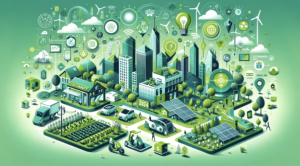
The Top Eco-Friendly Products of 2024 Leading the Green Revolution
As the world becomes increasingly aware of the environmental impact of consumer habits, the demand for sustainable products is surging. In 2024, businesses across industries are embracing sustainability, with innovative products designed to reduce waste, conserve resources, and promote ethical consumption. This article explores some of the top sustainable products revolutionizing the market in 2024, their impact on the environment, and the benefits they offer to consumers.

- Introduction to Sustainable Products in 2024
The year 2024 marks a significant turning point in the global market, where sustainability is no longer just a buzzword but a necessity. As climate change and environmental degradation become more pressing issues, consumers are increasingly seeking out products that are environmentally friendly, ethically sourced, and produced with minimal ecological impact. Companies, in turn, are responding by developing sustainable products that meet these demands while also setting new standards for quality and innovation.
- Why Sustainable Products Matter
Sustainable products are essential for a variety of reasons. They help reduce the carbon footprint, minimize waste, conserve natural resources, and often support fair trade practices. By choosing sustainable products, consumers contribute to a healthier planet and promote ethical business practices. Additionally, sustainable products often offer better durability and long-term cost savings, making them a smart choice for both individuals and businesses.
- Key Trends Driving the Adoption of Sustainable Products
Several key trends are driving the adoption of sustainable products in 2024:
- Consumer Awareness: Growing awareness of environmental issues is pushing consumers to prioritize sustainability in their purchasing decisions.
- Regulatory Pressure: Governments worldwide are implementing stricter regulations on waste management, carbon emissions, and resource use, encouraging businesses to adopt sustainable practices.
- Corporate Responsibility: Companies are increasingly recognizing the importance of sustainability as a core component of their corporate social responsibility (CSR) strategies.
- Technological Advancements: Innovations in materials science, recycling, and manufacturing are enabling the production of more sustainable products.
- Top Sustainable Products Revolutionizing 2024 Markets
Here is a look at some of the top sustainable products that are making waves in 2024:
4.1 Eco-Friendly Packaging
One of the most significant areas of innovation is eco-friendly packaging. As single-use plastics face increasing scrutiny, companies are turning to biodegradable, compostable, and recyclable alternatives. Products like plant-based packaging, mushroom-based materials, and edible packaging are gaining popularity. These options not only reduce plastic waste but also contribute to a circular economy by encouraging reuse and recycling.
4.2 Sustainable Fashion
The fashion industry, traditionally one of the most polluting sectors, is undergoing a transformation with sustainable fashion. Brands are now focusing on eco-friendly materials like organic cotton, bamboo, and recycled fabrics. Additionally, concepts like slow fashion, which promotes quality over quantity, and clothing rental services are reducing the industry’s environmental impact. Sustainable fashion is also closely linked to ethical labor practices, ensuring that workers are treated fairly.
4.3 Energy-Efficient Appliances
Energy efficiency is a crucial aspect of sustainability, and in 2024, energy-efficient appliances are leading the charge. From smart thermostats to energy-saving LED lighting and solar-powered devices, these products help consumers reduce their energy consumption and lower their utility bills. As renewable energy becomes more accessible, these appliances are also increasingly powered by clean energy sources, further reducing their environmental impact.
4.4 Sustainable Food Products
The food industry is also embracing sustainability with a range of innovative products. Plant-based meats, sustainable seafood, and organic produce are just a few examples of how the market is changing. These products not only reduce the carbon footprint associated with traditional agriculture and fishing but also address issues like animal welfare and biodiversity. Additionally, sustainable food packaging is helping to minimize food waste.
4.5 Eco-Friendly Personal Care Products
Personal care is another sector where sustainability is taking center stage. From zero-waste toiletries to biodegradable skincare products, consumers are now able to maintain their beauty routines without harming the planet. Brands are also reducing their reliance on harmful chemicals, opting for natural and organic ingredients instead. Refillable and reusable packaging is another trend that is gaining traction in this market.
- The Impact of Sustainable Products on the Environment
Sustainable products have a profound impact on the environment. By reducing waste, conserving resources, and promoting the use of renewable materials, these products contribute to a healthier planet. They also help mitigate climate change by lowering greenhouse gas emissions and reducing the reliance on fossil fuels. Furthermore, sustainable products support biodiversity by reducing habitat destruction and promoting sustainable agricultural practices.
- Challenges in Adopting Sustainable Products
Despite the numerous benefits, there are challenges to the widespread adoption of sustainable products:
- Cost: Sustainable products often come with a higher price tag due to the cost of ethical sourcing and production.
- Availability: In some regions, access to sustainable products may be limited, making it difficult for consumers to make environmentally friendly choices.
- Consumer Skepticism: Some consumers remain skeptical about the effectiveness of sustainable products, particularly when it comes to their durability and performance.
- Regulatory Barriers: Varying regulations across countries can create challenges for companies trying to standardize their sustainable practices globally.
- Future Prospects of Sustainable Products
The future of sustainable products looks promising, with several trends likely to shape the market in the coming years:
- Innovation: Ongoing advancements in technology will lead to the development of even more sustainable products, particularly in areas like biodegradable materials and renewable energy.
- Mainstream Adoption: As consumer demand grows and production costs decrease, sustainable products are likely to become more mainstream, making them accessible to a broader audience.
- Policy Support: Governments are expected to continue to play a critical role by implementing policies that encourage sustainability, such as tax incentives for green businesses and stricter regulations on non-sustainable practices.
- Circular Economy: The shift towards a circular economy, where products are designed for reuse and recycling, will drive the development of sustainable products that minimize waste and maximize resource efficiency.
Analysis Table: Key Benefits and Challenges of Sustainable Products
| Category | Key Benefits | Challenges |
| Eco-Friendly Packaging | Reduces plastic waste, promotes circular economy | Higher cost, limited availability |
| Sustainable Fashion | Reduces environmental impact, promotes ethical labor practices | Higher cost, consumer skepticism |
| Energy-Efficient Appliances | Reduces energy consumption, lowers utility bills, promotes renewable energy | Higher initial investment, availability of renewable energy sources |
| Sustainable Food Products | Reduces carbon footprint, addresses animal welfare, minimizes food waste | Higher cost, availability in certain regions |
| Eco-Friendly Personal Care | Reduces reliance on harmful chemicals, promotes zero waste | Higher cost, consumer skepticism |
Comparative Table: Sustainable Products vs. Traditional Products
| Aspect | Sustainable Products | Traditional Products |
| Environmental Impact | Lower, due to reduced waste and resource conservation | Higher, due to waste generation and resource depletion |
| Cost | Often higher due to ethical sourcing and production costs | Typically lower, mass-produced with less regard for sustainability |
| Durability | Generally high, designed for longevity | Varies, often designed for single or short-term use |
| Consumer Appeal | Increasingly popular among eco-conscious consumers | Wide appeal, particularly due to lower prices |
| Availability | Growing but still limited in some regions | Widely available globally |
| Corporate Responsibility | Integral to business strategy, focuses on ethical practices | Varies, often secondary to profit-focused objectives |
-
Conclusion
Sustainable products are revolutionizing the market in 2024, offering consumers and businesses alike a way to reduce their environmental impact. From eco-friendly packaging to sustainable fashion and energy-efficient appliances, these products are setting new standards for innovation, quality, and responsibility. While challenges remain, the future of sustainable products is bright, with continued growth and development expected in the coming years. By embracing these products, we can all play a role in creating a more sustainable and equitable world.










